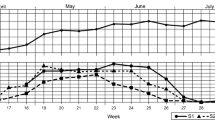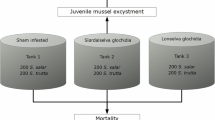Abstract
Interspecific hybridisation can alter fitness-related traits, including the response to pathogens, yet immunity is rarely investigated as a potential driver of hybrid zone dynamics, particularly in invertebrates. We investigated the immune response of mussels from a sympatric population at Croyde Bay, within the hybrid zone of Mytilus edulis and Mytilus galloprovincialis in Southwest England. The site is characterised by size-dependent variation in genotype frequencies, with a higher frequency of M. galloprovincialis alleles in large mussels, largely attributed to selective mortality in favour of the M. galloprovincialis genotype. To determine if differences in immune response may contribute to this size-dependent variation in genotype frequencies, we assessed the two pure species and their hybrids in their phagocytic abilities when subject to immune challenge as a measure of immunocompetence and measured the metabolic cost of mounting an antigen-stimulated immune response. Mussels identified as M. galloprovincialis had a greater immunocompetence response at a lower metabolic cost compared to mussels identified as M. edulis. Mussels identified as hybrids had intermediate values for both parameters, providing no evidence for heterosis but suggesting that increased susceptibility compared to M. galloprovincialis may be attributed to the M. edulis genotype. The results indicate phenotypic differences in the face of pathogenic infection, which may be a contributing factor to the differential mortality in favour of M. galloprovincialis, and the size-dependent variation in genotype frequencies associated with this contact zone. We propose that immunity may contribute to European mussel hybrid zone dynamics.



Similar content being viewed by others
References
Alcázar R, García AV, Kronholm I, de Meaux J, Koornneef M, Parker JE, Reymond M (2010) Natural variation at strubbelig receptor kinase 3 drives immune-triggered incompatibilities between Arabidopsis thaliana accessions. Nat Genet 42:1135
Brun NL, Renaud F, Berrebi P, Lambert A (1992) Hybrid zones and host-parasite relationships: effect on the evolution of parasitic specificity. Evolution 46:56–61. https://doi.org/10.1111/j.1558-5646.1992.tb01984.x
Baird SJE, Ribas A, Macholan M, Albrecht T, Pialek J, Gouy de Bellocq J (2012) Where are the wormy mice? A reexamination of hybrid parasitism in the European house mouse hybrid zone. Evolution 66:2757–2772. https://doi.org/10.1111/j.1558-5646.2012.01633.x
Barton NH, Hewitt GM (1985) Analysis of hybrid zones. Annu Rev Ecol Syst 16:113–148. https://doi.org/10.1146/annurev.es.16.110185.000553
Bayne B (1973) Aspects of the metabolism of Mytilus edulis during starvation. Neth J Sea Res 7:399–410. https://doi.org/10.1016/0077-7579(73)90061-6
Beaumont AR, Abdul-Matin AKM, Seed R (1993) Early development, survival and growth in pure and hybrid larvae of Mytilus edulis and M. galloprovincialis. J Molluscan Stud 59:120–123. https://doi.org/10.1093/mollus/59.1.120-b
Bierne N, David P, Boudry P, Bonhomme F (2002) Assortative fertilization and selection at larval stage in the mussels Mytilus edulis and M. galloprovincialis. Evolution 56:292–298
Bierne N, Borsa P, Daguin C, Jollivet D, Viard F, Bonhomme F, David P (2003) Introgression patterns in the mosaic hybrid zone between Mytilus edulis and M. galloprovincialis. Mol Ecol 12:447–461. https://doi.org/10.1046/j.1365-294X.2003.01730.x
Bierne N, Bonhomme F, Boudry P, Szulkin M, David P (2006) Fitness landscapes support the dominance theory of post-zygotic isolation in the mussels Mytilus edulis and M. galloprovincialis. Proc Biol Sci 273:1253–1260. https://doi.org/10.1098/rspb.2005.3440
Bomblies K, Weigel D (2007) Hybrid necrosis: autoimmunity as a potential gene-flow barrier in plant species. Nat Rev Genet 8:382
Boon E, Faure MF, Bierne N (2009) The flow of antimicrobial peptide genes through a genetic barrier between Mytilus edulis and M. galloprovincialis. J Mol Evol 68:461–474. https://doi.org/10.1007/s00239-009-9211-z
Coustau C, Renaud F, Maillard C, Pasteur N, Delay B (1991) Differential susceptibility to a trematode parasite among genotypes of the Mytilus edulis/galloprovincialis complex. Genet Res 57:207–212. https://doi.org/10.1017/S0016672300029359
Day PR, Day PR (1974) Genetics of host-parasite interaction. W. H. Freeman, New York
de Bellocq JG, Ribas A, Baird SJE (2012) New insights into parasitism in the house mouse hybrid zone. In: Piálek J, Macholán M, Munclinger P, Baird SJE (eds) Evolution of the house mouse. Cambridge University Press, Cambridge, pp 455–481
Derothe J-M, Le Brun N, Loubes C, Perriat-Sanguinet M, Moulia C (2001) Susceptibility of natural hybrids between house mouse subspecies to Sarcocystis muris. Int J Parasitol 31:15–19. https://doi.org/10.1016/S0020-7519(00)00155-7
Edwards CA, Skibinski DOF (1987) Genetic variation of mitochondrial DNA in mussel (Mytilus edulis and M. galloprovincialis) populations from south west England and south Wales. Mar Biol 94:547–556. https://doi.org/10.1007/BF00431401
Fritz RS, Nichols-Orians CM, Brunsfeld SJ (1994) Interspecific hybridization of plants and resistance to herbivores: hypotheses, genetics, and variable responses in a diverse herbivore community. Oecologia 97:106–117. https://doi.org/10.1007/BF00317914
Fuentes J, López J, Mosquera E, Vázquez J, Villalba A, Álvarez G (2002) Growth, mortality, pathological conditions and protein expression of Mytilus edulis and M. galloprovincialis crosses cultured in the Ría de Arousa (NW of Spain). Aquaculture 213:233–251. https://doi.org/10.1016/S0044-8486(02)00046-7
Gardner JPA (1994) The Mytilus edulis species complex in Southwest England: multi-locus heterozygosity, background genotype and a fitness correlate. Biochem Syst Ecol 22:1–11. https://doi.org/10.1016/0305-1978(94)90109-0
Gardner JPA, Skibinski DOF (1988) Historical and size-dependent genetic variation in hybrid mussel populations. Heredity (Edinb) 61:93–105. https://doi.org/10.1038/hdy.1988.94
Gardner JPA, Skibinski DOF (1990) Genotype-dependent fecundity and temporal variation of spawning in hybrid mussel (Mytilus) populations. Mar Biol 105:153–162. https://doi.org/10.1007/BF01344281
Gardner JPA, Skibinski DOF, Bajdik CD (1993) Shell growth and viability differences between the marine mussels Mytilus edulis (L.), Mytilus galloprovincialis (Lmk.), and their hybrids from two sympatric populations in S.W. England. Biol Bull 185:405–416. https://doi.org/10.2307/1542481
Gilg MR, Hilbish TJ (2003) Patterns of larval dispersal and their effect on the maintenance of a blue mussel hybrid zone in southwestern England. Evolution 57:1061–1077
Goldberg TL, Grant EC, Inendino KR, Kassler TW, Claussen JE, Philipp DP (2005) Increased infectious disease susceptibility resulting from outbreeding depression. Conserv Biol 19:455–462
Gosling EM, McGrath D (1990) Genetic variability in exposed-shore mussels, Mytilus spp., along an environmental gradient. Mar Biol 104:413–418. https://doi.org/10.1007/BF01314344
Hamilton WD (1980) Sex versus non-sex versus parasite. Oikos 35:282–290. https://doi.org/10.2307/3544435
Hilbish TJ, Bayne BL, Day A (1994) Genetics of the physiological differentiation within the marine mussel genus Mytilus. Evolution (N Y) 48:267–286. https://doi.org/10.1111/j.1558-5646.1994.tb01311.x
Hilbish T, Carson E, Plante J, Weaver L, Gilg M (2002) Distribution of Mytilus edulis, M. galloprovincialis, and their hybrids in open-coast populations of mussels in southwestern England. Mar Biol 140:137–142. https://doi.org/10.1007/s002270100631
Inoue K, Waite JH, Matsuoka M, Odo S, Harayama S (1995) Interspecific variations in adhesive protein sequences of Mytilus edulis, M. galloprovincialis, and M. trossulus. Biol Bull 189:370–375. https://doi.org/10.2307/1542155
Jiggins CD, Mallet J (2000) Bimodal hybrid zones and speciation. Trends Ecol Evol 15:250–255. https://doi.org/10.1016/S0169-5347(00)01873-5
Krasnovyd V, Vetesnik L, Gettova L, Civanova K, Simkova A (2017) Patterns of parasite distribution in the hybrids of non-congeneric cyprinid fish species: is asymmetry in parasite infection the result of limited coadaptation? Int J Parasitol 47:471–483. https://doi.org/10.1016/j.ijpara.2017.01.003
Kurtz J (2002) Phagocytosis by invertebrate hemocytes: causes of individual variation in Panorpa vulgaris scorpionflies. Microsc Res Tech 57:456–468. https://doi.org/10.1002/jemt.10099
Lawniczak MKN, Barnes AI, Linklater JR, Boone JM, Wigby S, Chapman T (2007) Mating and immunity in invertebrates. Trends Ecol Evol 22:48–55. https://doi.org/10.1016/j.tree.2006.09.012
Mancini E, Spinaci MI, Gordicho V, Caputo B, Pombi M, Vicente JL, Dinis J, Rodrigues A, Petrarca V, Weetman D, Pinto J, della Torre A (2015) Adaptive potential of hybridization among malaria vectors: introgression at the immune locus TEP1 between Anopheles coluzzii and A. gambiae in ‘Far-West’ Africa. PLoS ONE 10:e0127804
Maxwell FG, Jennings PR (1980) Breeding plants resistant to insects. Wiley, Hoboken
Miranda MBB, Innes DJ, Thompson RJ (2010) Incomplete reproductive isolation in the blue mussel (Mytilus edulis and M. trossulus) hybrid zone in the northwest Atlantic: role of gamete interactions and larval viability. Biol Bull 218:266–281. https://doi.org/10.1086/BBLv218n3p266
Moreira R, Balseiro P, Forn-Cuní G, Milan M, Bargelloni L, Novoa B, Figueras A (2018) Bivalve transcriptomics reveal pathogen sequences and a powerful immune response of the mediterranean mussel (Mytilus galloprovincialis). Mar Biol 165:61. https://doi.org/10.1007/s00227-018-3308-0
Parris MJ (2004) Hybrid response to pathogen infection in interspecific crosses between two amphibian species (Anura: Ranidae). Evol Ecol Res 6:457–471
Piertney SB, Oliver MK (2006) The evolutionary ecology of the major histocompatibility complex. Heredity (Edinb) 96:7–21. https://doi.org/10.1038/sj.hdy.6800724
Prager EM, Wilson AC (1975) Slow evolutionary loss of the potential for interspecific hybridization in birds: a manifestation of slow regulatory evolution. Proc Natl Acad Sci USA 72:200–204. https://doi.org/10.1073/pnas.72.1.200
Roth O, Kurtz J, Reusch TBH (2010) A summer heat wave decreases the immunocompetence of the mesograzer, Idotea baltica. Mar Biol 157:1605–1611. https://doi.org/10.1007/s00227-010-1433-5
Sanford E, Kelly MW (2011) Local adaptation in marine invertebrates. Ann Rev Mar Sci 3:509–535. https://doi.org/10.1146/annurev-marine-120709-142756
Skibinski DOF, Roderick EE (1991) Evidence of selective mortality in favour of the Mytilus galloprovincialis Lmk phenotype in British mussel populations. Biol J Linn Soc 42:351–366. https://doi.org/10.1111/j.1095-8312.1991.tb00568.x
Skibinski DOF, Beardmore JA, Cross TF (1983) Aspects of the population genetics of Mytilus (Mytilidae; Mollusca) in the British Isles. Biol J Linn Soc 19:137–183. https://doi.org/10.1111/j.1095-8312.1983.tb00782.x
Wendling CC, Wegner KM (2015) Adaptation to enemy shifts: rapid resistance evolution to local Vibrio spp. in invasive Pacific oysters. Proc R Soc B Biol Sci 282:20142244. https://doi.org/10.1098/rspb.2014.2244
Wiley C, Qvarnström A, Gustafsson L (2009) Effects of hybridization on the immunity of collared Ficedula albicollis and pied flycatchers F. hypoleuca, and their infection by haemosporidians. J Avian Biol 40:352–357. https://doi.org/10.1111/j.1600-048X.2009.04741.x
Wilhelm R, Hilbish TJ (1998) Assessment of natural selection in a hybrid population of mussels: evaluation of exogenous versus endogenous selection models. Mar Biol 131:505–514. https://doi.org/10.1007/s002270050342
Willis GL, Skibinski DOF (1992) Variation in strength of attachment to the substrate explains differential mortality in hybrid mussel (Mytilus galloprovincialis and M. edulis) populations. Mar Biol 112:403–408. https://doi.org/10.1007/BF00356285
Wiwegweaw A, Seki K, Utsuno H, Asami T (2009) Fitness consequences of reciprocally asymmetric hybridization between simultaneous hermaphrodites. Zool Sci 26:191–196. https://doi.org/10.2108/zsj.26.191
Wolinska J, Keller B, Bittner K, Lass S, Spaak P (2004) Do parasites lower Daphnia hybrid fitness? Limnol Oceanogr 49:1401–1407. https://doi.org/10.4319/lo.2004.49.4_part_2.1401
Wood HL, Sköld HN, Eriksson SP (2014) Health and population-dependent effects of ocean acidification on the marine isopod Idotea balthica. Mar Biol 161:2423–2431. https://doi.org/10.1007/s00227-014-2518-3
Zabal-Aguirre M, Arroyo F, Bella JL (2009) Distribution of Wolbachia infection in Chorthippus parallelus populations within and beyond a Pyrenean hybrid zone. Heredity (Edinb) 104:174
Acknowledgements
The authors thank Dr Jo Triner for her technical assistance and Dr Luke Holmes for providing graphical outputs. Work was funded by the School of Biological and Marine Sciences, University of Plymouth.
Author information
Authors and Affiliations
Corresponding author
Ethics declarations
Conflict of interest
All applicable international, national and/or institutional guidelines for sampling, care and experimental use of organisms for the study have been followed. The authors declare no conflict of interest. The datasets during and/or analysed during the current study are available from the corresponding author on reasonable request.
Additional information
Responsible Editor: T. Reusch.
Publisher's Note
Springer Nature remains neutral with regard to jurisdictional claims in published maps and institutional affiliations.
Reviewed by H. Stuckas and an undisclosed expert.
Rights and permissions
About this article
Cite this article
Tolman, D., Wood, H.L., Skibinski, D.O.F. et al. Differential immunity as a factor influencing mussel hybrid zone structure. Mar Biol 166, 151 (2019). https://doi.org/10.1007/s00227-019-3604-3
Received:
Accepted:
Published:
DOI: https://doi.org/10.1007/s00227-019-3604-3




